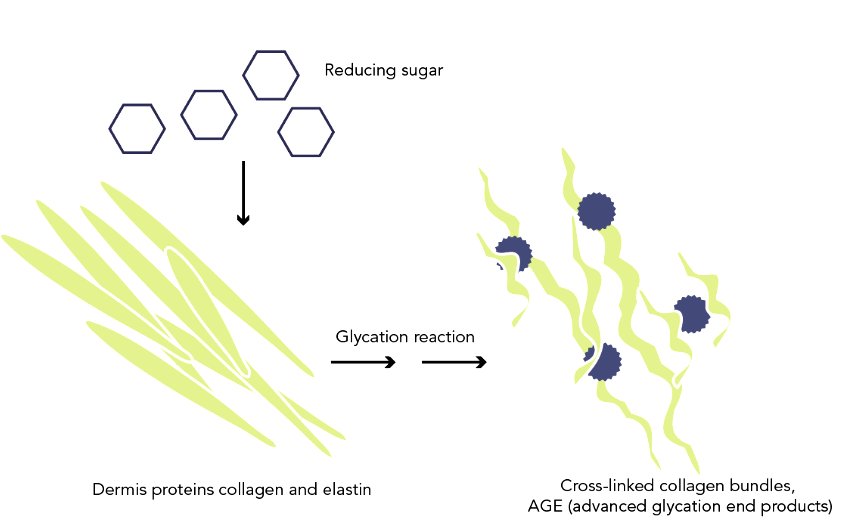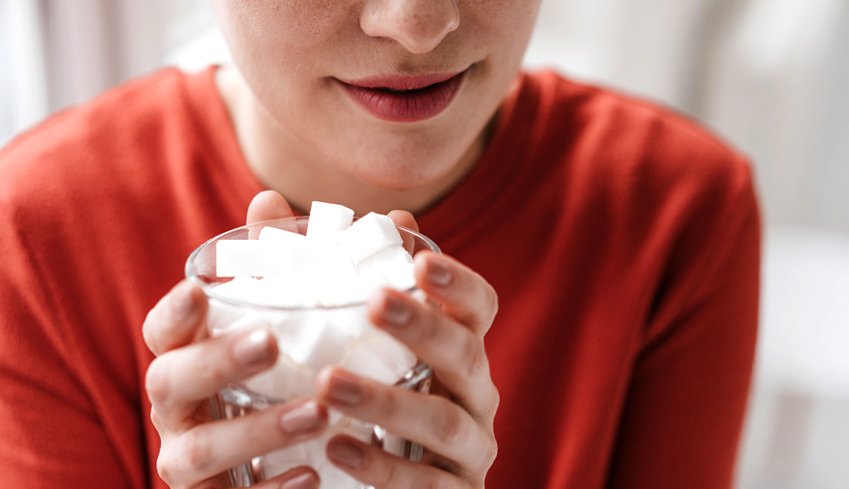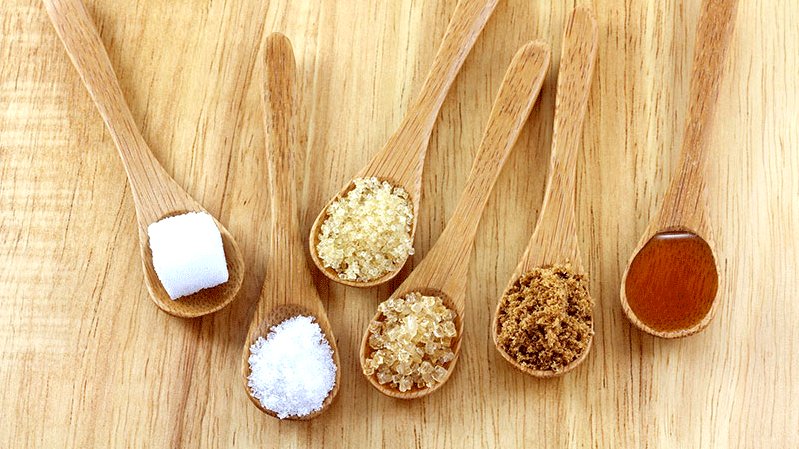Aging can be a source of great anxiety for many individuals, provoking thoughts of wrinkled skin and fine lines, among other signs that come with time passing by. Sugar has long been considered a contributor to aging, yet does scientific evidence back this belief up? Unfortunately, however, this answer may not be straightforward. An ongoing examination of sugar's influence on aging provides us with evidence pointing towards an association between sugar consumption and its impact on aging, but only to a certain degree.
A couple of ways in which this research suggests this connection. Glycation can result in harmful Advanced Glycation End Products (AGEs) and inflammation, making this one of the key outcomes from its processes. Sugar's role in hormone imbalance is another way it influences aging, leading to wrinkles and other signs of wear and tear on skin. Intrigueingly, individuals who consume an excessive amount of sugar have shorter telomeres - protective ends of our DNA which shorten as we age - than others who consume lesser sugar levels.
Sugar's effects on skincare and practical strategies to cut back and slow aging are two topics we explore here, delving deeper into how it impacts both our bodies and perception of it.
I. How Sugar Affects Aging
Aging is an unavoidable part of life that we all must face, yet various environmental and lifestyle factors can speed up this process. One such factor that has intrigued researchers worldwide is sugar consumption by individuals.
Glycation
Glycation is a metabolic process in which glucose molecules bind with protein molecules within cells to form advanced glycation end products (AGEs) which damage proteins and cells while simultaneously increasing inflammation and oxidative stress - two indicators associated with the aging process.
Skin Aging
Skin is one of the largest organs in our bodies, yet aging affects it as well. Accumulated Aged Generalized Enzymes (AGEs) can alter protein structure such as collagen and elastin production within skin cells resulting in wrinkles, fine lines, or sagging skin.
Telomere Length
Telomere length, another key indicator of aging, has also been linked with sugar intake. Telomeres are protective caps at the end of our DNA strands that shorten as we get older; excessive sugar consumption speeds this process up and shows an association between this food source and rate of aging.
>Research by the University of California, San Francisco indicates that individuals with high sugar intake rates tend to have shorter telomere length, signaling accelerated aging. This finding has direct ramifications as shorter telomeres have been linked with diabetes, cancer and cardiovascular conditions such as heart disease.
Hormonal Imbalances
Higher sugar intake levels can create hormone imbalances that have an adverse impact on skin health and the aging process, ultimately leading to wrinkle formation. Excess sugar triggers insulin release which may cause inflammation as well as skin damage that leads to wrinkles.
Conclusion: Sugar consumption causes glycation, the production of advanced glycation end products (AGEs), oxidative stress and inflammation - all key contributors to the accelerated aging process. Furthermore, correlations between sugar intake and hormonal imbalances and shortening telomere length highlight why cutting back on sugar intake is so crucial to slowing the inevitable process of aging. We will dive further into its effects on skin health to establish any correlations with rapid skin aging processes in subsequent sections.
Learn more at Healthline about How Sugar Affects Aging.II. Sugar's Effects on Skincare
Our skin is an astounding reflection of our bodies, yet diet plays an enormous role in its appearance and function. An excessive consumption of sugar can trigger inflammation and oxidative stress that undermine its look and feel, ultimately harming its aesthetic value.
Sugar's Effects on Aging
Sugar's effects on aging are numerous, with one of its primary manifestations being an increase in epidermal inflammation. When inflammation strikes, its body responds by creating free radicals - reactive molecules which damage cells and accelerate premature aging processes. Furthermore, inflammation has been found to aggravate existing conditions like acne or rosacea; studies have confirmed this correlation. Individuals with elevated blood sugar levels or who frequently consume foods high in sugar have more frequent outbreaks.
Wrinkles and Skin Slackening
Even more alarming is how sugar consumption can cause wrinkles and skin slackening. Consuming too much sugar generates an insulin spike that leads to inflammation and compromises collagen - an essential protein responsible for skin elasticity and tautness that must remain functional; without it resilient skin becomes vulnerable, leading to issues like wrinkles forming or sagging.
In 2010, a study published in the British Journal of Dermatology supported this link between sugar consumption and skin aging in an observational group of 6,000 people, concluding that those who indulged their sweet tooth had more laxity and wrinkles in comparison with those who refrained from overt sugar intake.
Sugar Addiction and Hormonal Imbalances
Sugar addiction may result in hormonal imbalances that impact skin health and the aging continuum, including acne flare-ups, reduced cell turnover rates and an overall dull skin appearance. These imbalances could contribute to premature aging as well as acne outbreaks or flare-ups and may contribute to premature skin slackening and cell damage - leading to premature wrinkles or dull skin appearances.
Sugar's Influence on Skin Health
Sugar's influence on skin health should not be overlooked, with its numerous negative consequences including inflammation, collagen disruption and destabilizing of hormones contributing to early signs of skin aging. As such, self-care means taking measures to limit sugar intake while providing your body with nutritious fruits, vegetables and naturally sweet alternatives for nourishment.
>“An excessive consumption of sugar can trigger inflammation and oxidative stress that undermine the look and feel of your skin, causing harm to its aesthetic value.”Conclusion
In conclusion, it is essential to maintain healthy eating habits and limit sugar intake to maintain skin health and prevent premature aging. Incorporating a balanced diet rich in nutrients and free from excess sugar can improve the look and feel of your skin. Take care of your skin with a healthy diet and a good skincare routine to preserve its youthful appearance.
III. Tips for Cutting Back on Sugar
Cutting back on sugar is no simple task, particularly if your taste buds lean toward sweet treats. But any change to your dietary regimen, no matter how minor, could potentially benefit both your health and skin's vitality. Perhaps these tips will be of use as you seek a low-sugar lifestyle.
Review Food Labels Closely
Sugar often hides in seemingly unsweetened foods. After reading labels closely, carefully analyze label information to detect sugar in various forms including high fructose corn syrup, dextrose, fructose and sucrose; reduce consumption of foods containing too much sugar such as syrupy cereals, flavored yogurts and fizzy beverages.
Consider Natural Sweeteners
Honey, maple syrup and stevia offer healthier options with lower calorie counts and decreased increments of blood glucose levels compared to traditional sweeteners such as white table sugar. Furthermore, these natural flavors bring many other health advantages without creating adverse health consequences associated with refined white sugars.
Incorporate Whole, Unprocessed Foods
Fruits, vegetables, whole grains and lean proteins all boast naturally low sugar contents while providing numerous other health advantages like increased fiber, vitamins and minerals content. Incorporating these nutritious items into your meals on an ongoing basis would be extremely beneficial to your wellbeing.
Limit Your Intake of Sugary Beverages and Snacks
Sugary beverages and snacks like carbonated drinks, confectionery juice, and other saccharine beverages may cause excessive sugar consumption. Sugary snacks like bonbons, chocolates and pastries should only be enjoyed occasionally; for an after-meal sweetener consider opting for natural sweet snacks like fruits or dates instead.
Adopt an All-Inclusive and Healthful Diet
While limiting sugar consumption is enormously beneficial to health, that does not equate to banning all forms of sweet treats altogether. By regulating and balancing your intake of food groups as well as using natural sweeteners such as honey to sweeten food products responsibly, you will ensure nutrient-rich food for both yourself and your skin's long term wellbeing.
Conclusions are clear:
An excessive intake of sugar has an adverse impact on aging processes. Glycation, the formation of Advanced Glycation End products (AGEs), inflammation, oxidative stress, shortening telomeres and hormonal imbalances result in cell malfunction and age related cellular malfunction. Since skin is the largest organ and requires nourishment and moisture for health and suppleness; adopt a balanced diet along with regular physical activity, stress reduction techniques and hydration into your lifestyle to protect it - thus deferring age while simultaneously attaining youthful appearance! By adopting these tips, you will start deferring age while simultaneously attaining youthful appearance!
Check out heart.org for sugar-reduction tips!IV. Balancing Indulgence and Health
Maintaining a youthful appearance in today's hectic world can be challenging, and indulging in sugary treats can exacerbate the aging process. While cutting back on sugar consumption is important, balancing indulgence with health is just as crucial to avoid feeling restricted or deprived.
Moderation is Key
When it comes to reconciling sweet cravings with healthy eating habits, moderation is key. Consumption of high sugar foods should only occur occasionally and complemented with nutritious items for balance.
Lifestyle Factors to Consider
Beyond eating right and managing stress effectively, lifestyle factors also play a crucial role in maintaining healthy skin. Exercise plays an integral part in weight control by improving blood flow to skin surface cells delivering oxygen and other essential nutrients; flushing out toxins from body which hinder skincare processes and can cause premature aging of skin surface cells; helping flush out impediments to skin surface health such as premature aging caused by impeding toxins from the body through sweat.
Integrating stress-relieving activities such as meditation, yoga and outdoor sports into one's routine can help decrease cortisol hormone releases that cause inflammation - leading to increased skin aging and acceleration of skin degeneration.
Stay Hydrated
Staying hydrated by drinking plenty of water is key to skin health and maintaining an ageless appearance. Water flushes out toxins from your body while simultaneously revitalizing and refreshing your complexion - leaving it looking radiantly youthful!
As sugar consumption and skin aging are inextricably linked, it's vital that small changes like natural sweeteners, healthy food choices and reading labels are made in your diet to slow the aging process and promote youthful skin appearance. Furthermore, regular exercise, stress management and hydration all play key roles in keeping our bodies nourished with essential moisture that contributes to maintaining a youthful and supple appearance - with regular practice of these tips you are one step closer to having glowing and radiant skin!
Conclusion
Attaining and maintaining youthful-looking skin are top goals for many today, and restricting sugar intake plays a significant role in reaching this objective. Even the mere thought of overindulgence should send alarm bells ringing for those concerned about their skin's resilience.
What makes sugar so harmful for our skin? It is crucial to note that excessive sugar consumption has numerous serious negative impacts, including glycation, inflammation, oxidative stress, hormonal imbalances and collagen damage - which in turn lead to premature aging, skin dullness and sagging. These side effects of excessive sugar intake may ultimately result in premature aging, dull skin texture and premature wrinkles if left unchecked.
However, you can overcome their negative impacts through making simple lifestyle adjustments that have an immediate positive effect on skin. These might include reading labels carefully to avoid high sugar products; switching out refined sweeteners for natural ones; eating nutritious food that promote skin health in moderation and saving indulgent treats for occasional enjoyment - these small lifestyle tweaks often have lasting results while making you look and feel younger than ever!




